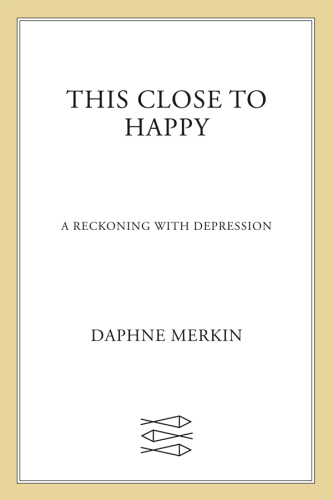
This Close to Happy
A Reckoning with Depression
روتوش با افسردگی
کتاب های مرتبط
- اطلاعات
- نقد و بررسی
- دیدگاه کاربران
نقد و بررسی

Starred review from November 14, 2016
Merkin’s deeply intimate account of living with clinical depression is illuminating, heartbreaking, and powerfully written. With lively prose and shrewd observations, Merkin (Dreaming of Hitler) examines the contending discourses on the potential causes of depression as she bravely exposes her lifelong struggle with suicidal thoughts and attempts to overcome them. Merkin arrives at no easy conclusions about childhood trauma or biological circumstances. She writes candidly about her lonely childhood with Holocaust survivor parents who were forced to fight their own demons. Despite her family’s wealth, Merkin and her siblings were subjected to austerity and abusive caretakers, and their mother was emotionally absent. Merkin’s exploration into her complicated yet unconditional devotion to her mother is rendered with compassion and profound perception. The book is not without humor or hope as Merkin takes readers on the journey from childhood to the present, and into her passion for literature. She writes about the past—such as the time when she was a young, aspiring writer who stayed with Saul Bellow at his summer home—into the present with the same astute eye. She also relates her experience with different treatments for depression, including the early days of Prozac and her frequent hospitalizations. Merkin eloquently blends the personal with the researched; her intellectual tenacity and emotional rawness impress as much as they entertain. This book is a wonderful addition to literature about the unrelenting battle against depression.

December 1, 2016
A writer reflects on her unceasing struggle with clinical depression.Although Merkin (The Fame Lunches: On Wounded Icons, Money, Sex, the Brontes, and the Importance of Handbags, 2014, etc.) is an undeniably talented writer, this memoir of her depression is as tough to read as it must have been to write. This is "the book about depression that I had been contacted to write by three successive publishing houses over the course of more than a decade," and the author admits that "my daughter has been dealing with the reality of my depression for so much of her life that I'm convinced it half bores her." Many readers will feel the same way, no matter how much they empathize with a writer who confesses, "most of all I am tired of myself and my battles." In the first sentence, Merkin introduces "the allure of suicide," an option that never goes away. She believes in the benefits of decades of therapy and medication, without which it's doubtful she would have been able to write this book. The author writes that the "root cause" of her depression is "the nature of the family itself, as rotten at its core as Hamlet's Denmark," and she builds a convincing case, particularly in regard to her cold, neglectful parents--though she finds it impossible to extricate herself from the mother who has ruined her. Hospital stays (the last was eight years ago) have provided respite and occasionally companionship, but circumstances have been rarely much better upon her exit. Merkin has deeply ambivalent feelings about electroshock treatment, resisting a doctor's suggestion of how much she would benefit and then regretting her refusal. Those who have read her incisive and well-crafted pieces as a staff writer for the New Yorker and a frequent contributor to the New York Times and Elle will wonder how she managed to get any work done when she was feeling so bad. It's hard to find much solace within the relentless gloom--however insightfully explored--of one writer's depression.
COPYRIGHT(2016) Kirkus Reviews, ALL RIGHTS RESERVED.

Starred review from December 1, 2016
Dark thoughts hover over virtually every page of this mesmerizing memoir, and yet there is also the very real possibility of hope. To outsiders, Merkin (The Fame Lunches, 2014) led what seemed to be a glamorous life as a New Yorker staff writer, but her moods changed swiftly and often: one minute she is fine, the next she feels like shooting her head off. Her depression respects no calendar, arriving precisely when it feels like it. Merkin allows readers inside her head to experience the darkness, as she recalls her difficult yet symbiotic relationship with her mother, who enjoyed cutting her daughter down to size with a cruel remark. She discusses her sessions with child psychiatrists and, later, a long series of shrinks; her passionate identification with Virginia Woolf, one of literature's most famous suicides; her stays in psychiatric hospitals; her postpartum depression; and her ever-present fear of being found out for the sad sack I felt myself to be. And yet she discovers the wherewithal to persevere and is even able to come this close to happy. Merkin's exceptional book belongs on the same shelf as such classics as William Styron's Darkness Visible (1990) and Kay Redfield Jamison's An Unquiet Mind (1995).(Reprinted with permission of Booklist, copyright 2016, American Library Association.)

September 15, 2016
Merkin (The Fame Lunches) expands on essays she has written for The New Yorker and the New York Times Magazine to clarify what it feels like to suffer from clinical depression over a lifetime.
Copyright 2016 Library Journal, LLC Used with permission.

























دیدگاه کاربران